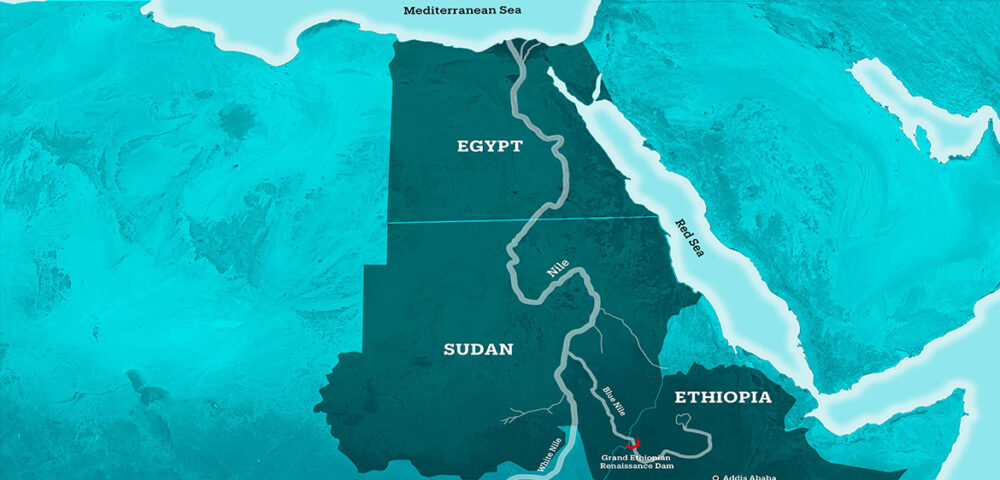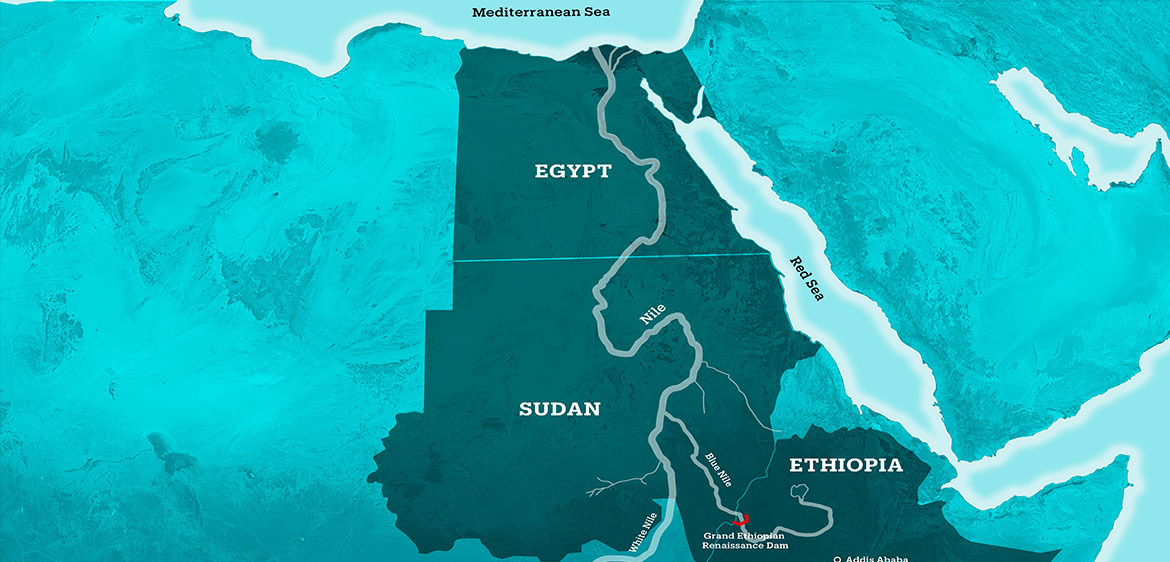BY: Begona Arechalde

PEJOURNAL – Last week, Ethiopia and Egypt, two countries nourished by the waters of the Nile River, again exchanged threats of military intervention regarding the filling of the $4.5 billion hydroelectric dam that Ethiopia is building in the east of the country. The dam, known as the Grand Ethiopian Renaissance Dam (GERD) and Africa’s largest, is becoming a contemporary Rubicon that, if crossed, could irreparably harm the relationship between these two countries. On Tuesday, July 21, a new round of online negotiations managed to reduce tensions, putting the cooperation option back on the table.
The Grand Renaissance Dam is a mega-construction project promoted by the Ethiopian government in 2011 in order to generate the electric power necessary for the development of the country. With a booming economy despite political instability in recent decades, Ethiopia seeks to lift some 110 million people out of poverty and achieve ‘middle-income country’ status by 2025. The announcement was received with consternation by Egypt and Sudan, main beneficiaries of the 1959 Nile Waters Agreements. Egypt, whose water supply is 90% dependent on the Nile, fears that the project will desert 30% of its farmland and reduce the total amount of available water by 20%. Sudan would benefit from the project, but is watching it cautiously since Egypt is a powerful ally.
The tripartite negotiations that have been taking place since 2011 have yielded bitter results. The main problem is not the construction of the dam but its modus operandi. If the dam fills up too quickly, the impact on the downstream nations would be dire; If the dam is built too slowly, Ethiopia would undermine its economic development, a price that the country’s political situation cannot afford. In 2011, Egypt proposed a joint management solution for the operation of GERD to which Ethiopia opposed, claiming that such intervention would be an attack on its sovereignty, and insists on the unilateral nature of the project.
Almost all independent studies on the construction of the hydroelectric dam agree that, once completed, it will benefit everyone. Ethiopia could triple its electricity production, flooding in Sudan would decrease and Egypt would see evaporation rates in Aswan High Dam drop substantially while increasing its hydropower reserves.
The construction of the dam has also sparked hopes for regional cooperation in hydraulic infrastructure projects and the creation of a hydro-energy market that would make the Nile basin’s countries less dependent on foreign supply. But reality is never so simple. The sticking points include water security associated with the volume stored and stages of impounding the dam; dam safety; and water quality as well as the distribution of benefits and unpredictable natural risks such as droughts. At stake are also historical, economic and geopolitical interests.
In Ethiopia, the complexity of multi-ethnic nationalism plays a crucial role in decision-making in both foreign and economic policy. With elections just around the corner, Prime Minister Abiy Ahmed seeks to improve the country’s internal situation, which in recent weeks has been shaken by violent protests fueled by the Oromo Liberation Front.
According to reports from the Crisis Group “the construction of GERD is something that all Ethiopians can unite around”. News of reservoir-filling work in the Grand Renaissance Dam came just a few days after the death toll from the protests exceeded 160. Hydroelectric production will also increase Ethiopia’s leverage in the Horn of Africa, the which received a painful blow when losing its coastline after the independence of Eritrea in 1991.
Egypt, for its part, has historically maneuvered on the regional and international landscapes thanks to its strategic position and control over the Suez Canal, which connects the Mediterranean Sea and the Red Sea. Such resources have served Egyptian politicians as a bargaining chip to advance the country’s interests in the international arena.
Already under the government of Anwar Sadat and Hosni Mubarak, concessions in the Suez Canal were used to force the Israeli withdrawal from the Sinai. Following the failed Muslim Brotherhood’s rule over Egypt, incumbent Abdel Fattah el-Sisi’s government focused its early foreign policy in seeking new funding sources and confronting emerging terrorism in the Middle East, but after reelection in 2018, its priority has been to alleviate economic problems. The government is also pressured by the private sector and public opinion which melancholically claims post-colonial Nasserist preponderance
Therefore, in the face of increasing tension over the dam’s filling and operation processes, neither side can allow itself to be weak. Egypt adheres to treaties signed with Great Britain in 1902 and Sudan in 1959 that gave it control over most of the Nile. Ethiopia considers these treaties invalid and resorts to the 2015 Cooperative Framework Agreement (CFA) which states that “all Nile basin states are entitled to a reasonable and equitable share in the beneficial uses of the waters of an international drainage basin”. Such shares are currently far from being reasonable and equitable.
Last June, Egypt declared that the filling of the dam without an agreement represented an ‘existential’ threat, as Egyptians’ survival depends on the Nile, and that it would not hesitate to use all the ‘means necessary’ to guarantee the security of the water supply.
Addis Ababa replied that they are ready to counterattack. So far, Egyptian hackers launched a cyber attack on Ethiopian officials last June from which the government has disassociated itself. Egypt and Ethiopia are among the five most powerful military forces in Africa. Despite its limited budget, Ethiopia has the continent’s most efficient soldiers. A war between the two would be a catastrophe.
Moreover, instability in the region grows day by day due to the interests of third actors, who have taken advantage of the situation to add their opinions to the water dispute. The Horn of Africa has become the focus of attention of countries in pursuit of establishing new commercial ports and military bases along the Red Sea. Particularly intense is the presence of the United Arab Emirates and Saudi Arabia, who want to restrict the influence of Iran and Qatar in the region and support Cairo in the dispute.
Turkish influence is also important as it is Ethiopia’s main commercial partner along with China and Israel. Debt weavers have also been quick to take a bite out of it. For example, Germany has offered itself to finance economic compensation from Egypt to Ethiopia if GERD is to fill in a period of time that would hamper Ethiopia’s economic development. The third nation involved in the negotiations, Sudan, welcomes foreign interests, particularly Saudi Arabia’s and Turkey’s, which want to invest in the country.
Despite increasing militarization in the Red Sea, expert analysts believe that armed conflict between Egypt and Ethiopia is unlikely and that the dispute will remain a political conflict, as the benefits of cooperation are high for both of them. Egypt faces a greater threat to its security from the West, in Libya, and cannot afford to meddle in another potential war.
For this reason, Cairo has requested the mediation of the United Nations and the United States. Ethiopia has asked South Africa to intervene, suspicious of the neutrality of the United States due to its geopolitical interests in the Middle East. Some have proposed China as a mediator since it maintains a good relationship with both countries and has financed a large part of the dam construction and other major infrastructure projects in Ethiopia.
International organizations welcomed Ethiopia’s and Egypt’s decision to request international mediation. On Tuesday July 21, the African Union (AU) hosted an online conference to discuss the situation, try to deescalate tensions and unlock tripartite talks. Apparently that is just what happened.
Although details about the conference have not been published, Ethiopia’s Prime Minister said that his country, Egypt and Sudan reached a “major common understanding which paves the way for a breakthrough agreement”. In an official statement issued by the Ethiopian government, the three country leaders have pledged to continue “further technical discussions on the filling … and proceed to a comprehensive agreement”. Egyptian President el-Sisi has stressed Egypt’s “sincere will to continue to achieve progress over the disputed issues”.
The two main objectives of future negotiations are, first, to agree on a dam filling rate timeline and, second, to negotiate a long-term treaty that includes all riparian states, with no loopholes that Ethiopia may feel tempted to exploit.
With the arrival of the rainy season, reaching an agreement has became a pressing need. Cairo is aware that the longer it takes to sign a deal the greater the risk that Ethiopia wants to further expand the exploitation of the Nile. Ethiopia must proceed without allowing internal instability to hinder cooperation in foreign policy. Mediators hope that Ethiopia and Egypt will continue listening to reason, accepting that they cannot get everything they want and understanding that the benefits of cooperation will bring greater prosperity to their people in the not-too-distant future.
The main obstacle to reaching such an agreement is mutual suspicion, which must be further deescalated before foreign powers decide to capitalize on it to advance their interests in the Horn of Africa.
